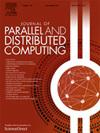减轻容器化环境中的DDoS攻击:Docker和Kubernetes的比较分析
IF 3.4
3区 计算机科学
Q1 COMPUTER SCIENCE, THEORY & METHODS
引用次数: 0
摘要
容器化已经成为部署应用程序的主要方法,其中web服务最为流行。但是,将服务器IP地址暴露给外部连接会使容器化服务容易受到DDoS攻击,从而耗尽服务器资源并阻碍合法用户访问。为了解决这个问题,我们实施了12种不同的缓解策略,在三种常见的web服务类型上进行了测试,并在Docker和Kubernetes部署平台上进行了实验。此外,本研究引入了一个跨平台的、编排感知的评估框架,该框架模拟了现实的多服务工作负载,并分析了不同并发条件下的防御策略性能。实验结果表明,Docker在管理白名单流量和延迟攻击者响应方面表现出色,而Kubernetes通过同时处理所有请求,实现了低完成时间、最小响应时间和低故障率。基于这些发现,我们为选择适合不同编排环境和工作负载模式的适当缓解策略提供了可操作的见解,并为保护容器化部署免受低速率DDoS威胁提供了实用指导。我们的工作不仅提供了经验性能评估,还揭示了部署特定的权衡,为构建弹性云原生基础设施提供了战略建议。本文章由计算机程序翻译,如有差异,请以英文原文为准。
Mitigating DDoS attacks in containerized environments: A comparative analysis of Docker and Kubernetes
Containerization has become the primary method for deploying applications, with web services being the most prevalent. However, exposing server IP addresses to external connections renders containerized services vulnerable to DDoS attacks, which can deplete server resources and hinder legitimate user access. To address this issue, we implement twelve different mitigation strategies, test them across three common types of web services, and conduct experiments on both Docker and Kubernetes deployment platforms. Furthermore, this study introduces a cross-platform, orchestration-aware evaluation framework that simulates realistic multi-service workloads and analyzes defense strategy performance under varying concurrency conditions. Experimental results indicate that Docker excels in managing white-listed traffic and delaying attacker responses, while Kubernetes achieves low completion times, minimum response times, and low failure rates by processing all requests simultaneously. Based on these findings, we provide actionable insights for selecting appropriate mitigation strategies tailored to different orchestration environments and workload patterns, offering practical guidance for securing containerized deployments against low-rate DDoS threats. Our work not only provides empirical performance evaluations but also reveals deployment-specific trade-offs, offering strategic recommendations for building resilient cloud-native infrastructures.
求助全文
通过发布文献求助,成功后即可免费获取论文全文。
去求助
来源期刊

Journal of Parallel and Distributed Computing
工程技术-计算机:理论方法
CiteScore
10.30
自引率
2.60%
发文量
172
审稿时长
12 months
期刊介绍:
This international journal is directed to researchers, engineers, educators, managers, programmers, and users of computers who have particular interests in parallel processing and/or distributed computing.
The Journal of Parallel and Distributed Computing publishes original research papers and timely review articles on the theory, design, evaluation, and use of parallel and/or distributed computing systems. The journal also features special issues on these topics; again covering the full range from the design to the use of our targeted systems.
 求助内容:
求助内容: 应助结果提醒方式:
应助结果提醒方式:


